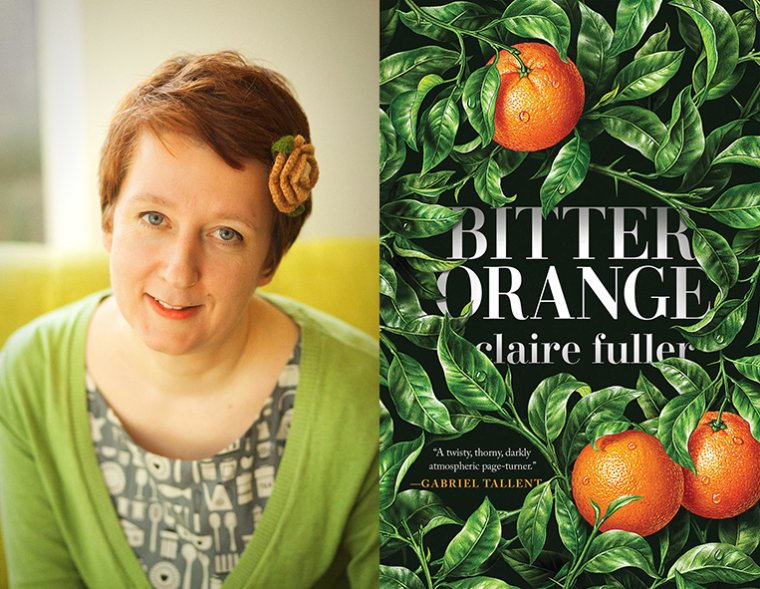This week’s installment of Ten Questions features Claire Fuller, whose third novel, Bitter Orange, is out today from Tin House Books. A literary mystery, Bitter Orange is the story of Frances Jellico, who, in the summer of 1969, takes a job researching the architecture of a dilapidated mansion in the English countryside and finds a peephole underneath a floorboard in her new bathroom that gives her access to her neighbor’s private lives. Novelist Gabriel Tallent calls it “a twisty, thorny, darkly atmospheric page-turner.” Fuller, who didn’t start writing until she was forty, is the author of two previous books, Swimming Lessons (2017) and Our Endless Numbered Days (2015), both published by Tin House Books. She lives in Hampshire, England, with her husband and two children.

Claire Fuller, author of Bitter Orange. (Credit: Adrian Harvey)
1. Where, when, and how often do you write?
I worked for so many years in a nine-to-five-thirty job that I can’t get out of that habit. I’m at my desk most days for most of the day, doing bits of novel writing, in between other bits of writing, answering e-mails, and reading. I try to keep weekends free of writing, but depending on where I am in the cycle of publishing that doesn’t always work.
2. How long did it take you to write Bitter Orange?
Almost exactly two years, and then some additional time for edits and so on. I keep a writing diary, just a line a day with my word count and whether the day has gone well or badly. Mostly it’s badly, but that helps to look back on when I’m writing the next one.
3. What was the most surprising thing about the publication process?
How long it can take from a publisher buying a novel to that book being on the shelves in bookshops. I’m not a very patient person and having to wait so long —nineteen months in one case—is not easy.
4. What is one thing you’d change about the literary community and/or the publishing business?
I’d like there to be less focus on one lead book a season by large publishers, and instead for them to spread their publicity and marketing budgets more broadly. Industrywide it seems that only a few books get a massive push, while lots of many brilliant novels that publishers have bought are left to either sink or swim by themselves.
5. What are you reading right now?
I’m reading Fever Dream by Samanta Schweblin, translated by Megan McDowell. It’s a sinister and strange story so mixed up and feverish that it’s hard to tell what’s real and what isn’t. Reading it is a wonderful distraction.
6. Who is the most underrated author, in your opinion?
I think Barbara Comyns could be better known. Her novels are wonderfully quirky, full of people who levitate or go mad from ergot poisoning. It’s hard to know whether she’s underrated—there are a lot of people who know her work, but probably lots more who don’t.
7. What trait do you most value in an editor?
I’m lucky to have two amazing editors: Juliet at Penguin in the UK, and Masie at Tin House in the US. They both work very differently, and although sometimes I’m sitting in the middle trying to sort out differing advice, I value hugely what they both have to say. Juliet is very good at the high-level view of a novel, while Masie and I will have long Skype conversations about whether a ‘sleeveless vest’ is actually a thing, whether US readers will have heard of Fuzzy Felt, or if Americans eat cauliflower cheese or cauliflower with cheese sauce. I love getting into the nitty-gritty of a novel, right down to the sentence and the word level.
8. What is the biggest impediment to your writing life?
My own procrastination. Reading all my reviews (and no, it’s not possible to stop). My untidy writing room. My cat, who I got in order to have a writer’s cat, but who loves my husband more than me. Reading other people’s brilliant novels (and no, I’m not going to stop).
9. What’s one thing you hope to accomplish that you haven’t yet?
Finish my fourth novel? Or just write the next damn sentence. When I’m only at 11,000 words all of it feels like an insurmountable task.
10. What’s the best piece of writing advice you’ve ever heard?
Write like “none of it happened, and all of it is true,” which, if I’ve got my source correct, is something Ann Patchett’s mother said.







